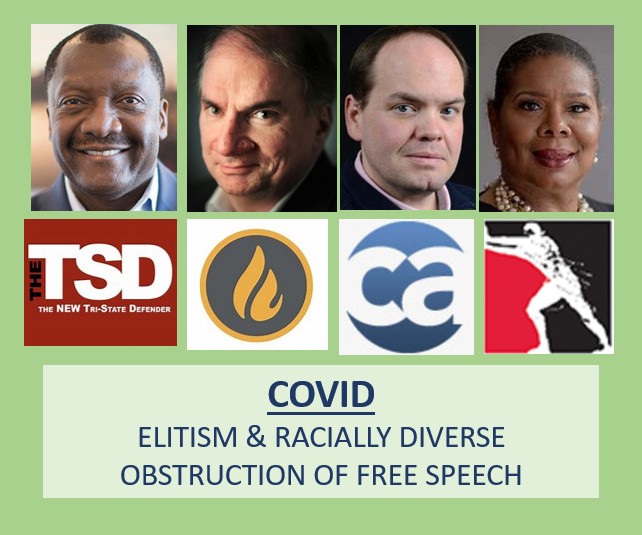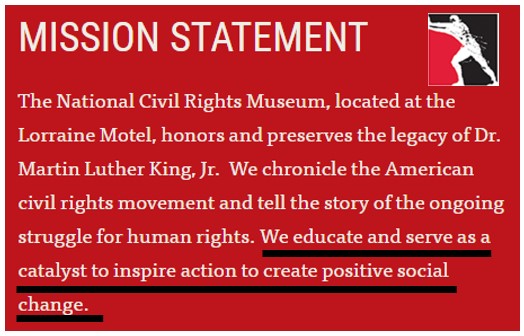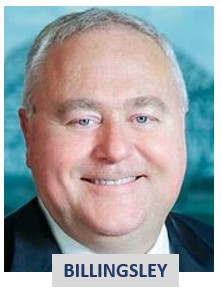One would think that during COVID, with limits on the public’s participation in public meetings, that the press and other institutions would step up their game. That is not the case in Memphis and includes the likes of the National Civil Rights Museum, who actually celebrates free speech and protest. Its an exercise in racially diverse elitism and the oppression of free speech.
Recently, I submitted a piece to the Tri State Defender (TSD). Prior to the purchase of TSD by a group led by Calvin Anderson, Dr. Anjanku would publish my submissions and edit them if necessary. Over the course of our relationship, Anjanaku published 3 of 4 pieces of my work. And I appreciated it.
Now after the Anderson purchase of TSD, I cannot even get a courtesy response on a TSD submission. As a note, Anderson was part of the EDGE Task Force 2 yrs ago, that accomplished nothing and also serves on the LaunchTN startup board, which has neglected Memphis from startup investments when compared to the rest of the state.
Further, under Dann Miller, the Commercial Appeal (CA) is obstructing commenting on their articles, which discriminates against Memphians, when compared to CA’s other Tennessee markets. And the Daily Memphian has never been willing to even consider my customer submissions, as Bill Dries fails to report on the recent County Commission obstruction of requested due diligence on a $62M consideration. That obstruction is discussed below in my now published rejected TSD submission.
And finally, the National Civil Rights Museum (NCRM), in all of their glory about free speech and protest, cannot take public criticism of their elitist and oppressive NCRM Board and Executive Committee. Its a board that appears to get together from time to time to masturbate about their social justice accomplishments, while exchanging business leads for further elitist oppression.
NCRM Exchange
During the NCRM 1/18/21 MLK birthday virtual celebration, the NCRM deleted my protest comment that effectively said that “MLK would puke all over the NCRM board”. NCRM is not about free speech but seems much more about controlling an elitist narrative that is focused on Civil Rights history of 50 years ago and beyond, while ignoring the elitist oppression occurring today.
Here is an email from Terri Freeman to me regarding the 1/18/21 event, where Freeman cites the NCRM mission statement. The fact is that the NCRM Board’s strategic direction of almost exclusively focusing on history of 50 yrs ago and beyond, violates their mission statement component of: educating and serving as a catalyst to inspire action and create positive social change.
Per the NCRM bylaws, a Board Executive Committee oversees daily NCRM staff operations, by individuals likely heavily influenced by the following local corporations: AutoZone, First Horizons, Baptist Hospital, FedEx and International Paper. Its effectively the same companies that are predominantly represented on all the local non-profit boards, stifling local thought diversity.
Anyway, below is a rejected piece, submitted to the TSD, that attempted to get in mainstream publication, the County Commission obstruction of requested due diligence that occurred on December 21, 2020.
Rejected TSD Column
Curtis Weathers recently wrote a compelling piece on the educational opportunities provided by the tragic events at our Nation’s Capitol on January 6, 2021. While sad, the event offers robust National civic exploratory inquiry into the Constitution, impeachment process, first amendment and social media. The only advantage to the event is that it was press covered and everyone saw it, which provides the opportunity for deeper analysis. Much harder to see, is what goes uncovered regarding local government, by the local press, while perhaps undermining the local community.
So, what about local Memphis history and government? It must be stated that the Tennessee State Civics Standards do not even mention such terms as “governmental oversight” or “quasi- governmental agencies”. Local quasi-government agencies are public board bodies, with staffs and budgets, that operate outside of traditional government. Such agencies include the likes of Memphis Light Gas and Water (MLGW), Economic Development Growth Engine (EDGE) and Downtown Memphis Commission (DMC).
These organizations have either direct control over local tax dollars or have significant influence over the well being of the local population. These are also agencies that operate under the auspices of local governmental oversight and involve multi-million-dollar questions impacting the local community.
While not locally reported, the Shelby County Commission made history on December 21, 2020 by neglecting their oversight function, which is arguably common, and going further to obstruct requested due diligence on a $62M funding allocation, for public parking, made by the Downtown Memphis Commission. The County Trustee, Assessor and Chief Financial Officer all made requests to perform due diligence on the matter, but were overtly obstructed by the Shelby County Commission!
The $62M request involved the use of taxpayer money, funded through a restricted fund that no one in County government seemed to know about, as expressed through on the public record testimony. On December 7, 2020, the $62M matter was correctly referred to committee for due diligence, based on a motion made by Commissioner Mark Billingsley. At the next Commission meeting, on December 21, 2020, Billingsley strangely reversed his position and moved to reconsider the $62M question, effectively obstructing, requested by County officials, due diligence. This is a stunning piece of local history.
The former does not mention that on December 21, the DMC made at least two, on the record, material misrepresentations involving 1) mistaken annual City and County tax dollar contributions to the fund and 2) the understating of parking garage fund financial liabilities by $12M. Both misrepresentations greased the skids for not performing due diligence and approving the $62M public parking allocation. The $62M approval was for public parking, that is not presently needed, based on the DMC downtown parking study.
Further, due diligence would have revealed $23M in possibly illegal taxpayer funded loans made to private developers using the fund. Given this local historical event, if it is somehow possible to be accommodated by the state standards in the local curriculum, these are questions that might arise for local curricular exploration:
- How many quasi-governmental agencies, with their own budgets and assets funded by taxpayers, operate outside of local government, where local government has oversight authority?
- How have external agencies impacted local budgets for education, public safety, infrastructure, and public health?
- How much have quasi-governmental agencies abated in local taxes and how does that compare with other municipalities in the rest of the state?
- What is the role of the free press in covering local government oversight of quasi agencies and non-profits or lack thereof?
Needless to say, these quasi-governmental agencies and corresponding local government oversight have significant impact on our local community. Are our leaders of tomorrow learning anything at all about this critical area of local public governance?
Conclusion
Not part of the original restrained TSD submission, the potentially illegal garage loans above, involve Puke Hyde, who chairs the NCRM Executive Committee. The currency in Memphis is not “Moving Memphis Forward” but instead glorifying elitist oppression…..



